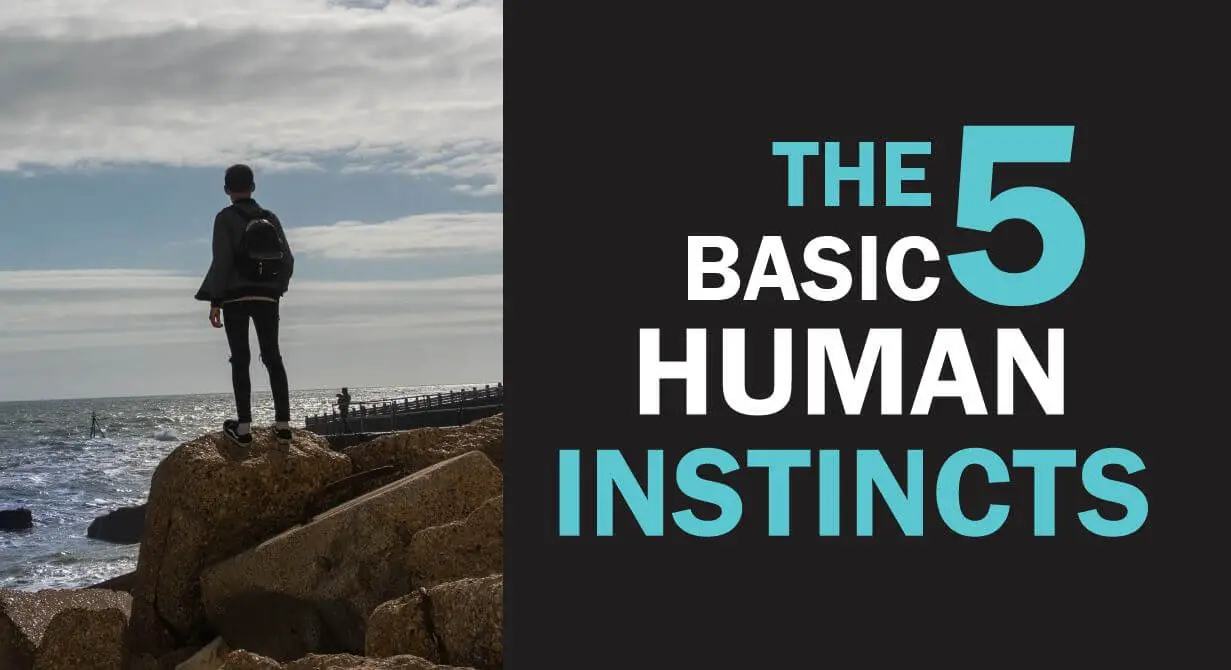We always talk about instincts and how they trigger our behaviours, but we hardly know how they operate. What are the 5 basic human instincts?
Have you ever wondered why you do the things you do? Why do you act in certain ways or make certain decisions?
As a human, you are a complex being with a multitude of thoughts, emotions, and motivations.
But at your core, you are also driven by a set of fundamental instincts that have been ingrained in you since the beginning of our species.
In this discussion, we’ll explore the 5 basic human instincts that shape who you are and influence your behaviours.
From your innate drive to survive to your instinctual need for social connection, these instincts have played a crucial role in our evolution and continue to guide us in our daily lives.
Recommended: Common Ground between EQ and Primal Instincts
Overview of Human Instincts
Instinct is a natural, automatic, and intuitive impulse that we all possess. It’s a survival mechanism that helps us make split-second decisions in times of danger or uncertainty.
Not only that they keep us away from danger, but they also control or trigger our urges for hunger, reproduction, and other basic survival needs of humans.
These instincts are involuntary, innate, and universal, present in all of us regardless of age, race, gender, or culture.
These instincts exist to help us adapt to our environment and survive in challenging situations.
They have developed through evolution and are deeply ingrained in our biology.
Related: Strengths and Weaknesses of Extraverted Intuition
What are the 5 Basic Human Instincts?
As described above, instincts are the driving forces behind our actions and behaviors as humans, and they help us survive and thrive in the world.
Here are the basic five instincts:
- Self-preservation Instinct
- Reproduction Instinct
- Socialization Instinct
- Curiosity Instinct and
- Creativity Instinct
1. Self-preservation Instinct

This is the drive to protect yourself from harm and danger.
Self-preservation instinct, in simple terms, is the innate drive towards self-preservation or the protection of yourself from harm or danger.
The instinct is present in all living beings, from animals to humans, and it is a fundamental aspect of survival.
It’s the reason we jump when we hear a loud noise, or why we avoid walking down a dark path alone at night.
The self-preservation instinct is triggered by a variety of stimuli, such as fear, pain, hunger, or even just a sense of discomfort.
When our bodies sense danger, instinct kicks in, and our biological responses are activated.
These responses can include an increased heart rate, heightened sensitivity to our surroundings, and an adrenaline rush, all in preparation for a fight or flight.
Related: Instinctual Motivation: How Instincts Drive Desire For Status
2. Reproduction Instinct

This is the drive to procreate and continue our species. It’s why we are attracted to certain individuals and want to have children.
At its heart, the reproduction instinct is all about our desire to pass on our genes to the next generation.
For humans, this means finding a partner, falling in love, and starting a family.
But this instinct is not just limited to us; all living creatures – be it plants, animals, or even bacteria – have evolved ways to reproduce and keep their species alive.
In humans, the reproduction instinct manifests itself in many ways.
From the first stirrings of attraction to the rush of hormones during sexual intimacy, our bodies and minds are wired to seek out and connect with others.
And let’s not forget the feelings of joy and fulfillment that come with parenthood – the urge to care for and protect our offspring is just another part of this powerful instinct.
But despite its importance, the reproduction instinct is often shrouded in taboos and misconceptions.
Many people are uncomfortable talking about sex and sexuality, while others struggle with infertility, pregnancy loss, or complicated family situations.
These challenges can make it hard to fully embrace our innate desire to reproduce and connect with others.
Related: Fear Propaganda: How It is Used For Psychological Manipulations
3. Socialization Instinct

This is the desire to connect with others and form relationships. It’s the reason we seek out friendships and romantic partnerships, and why we engage in group activities like sports or clubs.
It’s what makes us seek out companionship and even build familial bonds.
Studies have shown that socialization is a basic need for humans – we need human interaction to thrive.
It’s not just about forming connections, though. The human socialization instinct also drives us to conform to social norms and expectations.
We learn how to behave and interact with others by observing those around us and mimicking their behavior.
It’s why we tend to conform to the practices and customs of our culture and community.
Of course, the way we socialize has evolved. In the past, socialization may have been more closely tied to survival – forming bonds with other people meant a better chance of staying alive.
Today, however, socialization is more about building relationships for emotional fulfillment and social support.
But even though our socialization instincts might not be as closely tied to survival as they were in the past, they’re still incredibly important.
Studies have found that people with strong social connections have better physical and mental health outcomes than those who are isolated.
Related: How To Master Your Sense Of Agency And Sensory Intelligence
4. Curiosity Instinct

This is the drive to explore and learn about our environment. It’s why we ask questions, try new things, and delve into subjects that interest us.
It’s amazing how curious we can be about small things in our everyday life, that’s because our curiosity is what makes us innovative thinkers, and it’s what drives our progress in the world.
Our innate human curiosity is what motivates us to learn new things, explore unknown territories, and discover the unknown.
Ultimately, it sets us apart from other species on the planet.
From the moment we are born, we show an inclination to explore our surroundings and learn new concepts.
We develop a natural interest in the world’s various elements and want to know more about them.
This natural curiosity is what leads to our development as individuals and our progress as a society.
Curiosity also helps us develop our critical thinking skills, as we continue to ask questions and seek answers.
This allows us to make more informed decisions and enables us to thrive in our increasingly complex world.
Related: How Primal Instincts Keep You Alive
5. Creativity Instinct

Creativity instinct in humans is the innate ability to think, imagine, and create novel and innovative ideas or products.
It is an inherent ability that is present in every human being, but it varies in degree from person to person.
Humans have an intrinsic urge to explore and experiment with new ideas and concepts, which leads to the generation of groundbreaking discoveries and inventions.
Creativity instinct allows humans to come up with unique solutions to complex and challenging problems, enabling them to adapt to their surroundings and cope with them.
The creativity instinct is rooted in the human brain’s cognitive processing and mental processes, which encompasses various cognitive domains such as divergent thinking, imagination, intuition, and cognitive flexibility.
These cognitive processes enable humans to think beyond the limitations of established norms and conventions and explore new perspectives and avenues of thought.
Moreover, the creativity instinct is influenced by various external factors such as environment, socio-cultural setting, and personal experiences.
Exposure to different cultures, ideas, and stimuli can stimulate creativity, as it encourages people to view things from different perspectives and generate novel insights and ideas.
Related: Primal Instincts In the Modern-Day
Frequently Asked Questions
What are the 5 basic human instincts?
The five basic human instincts are survival, reproductive drive, social bonding, aggression/defense, and exploration/curiosity.
What is the strongest human instinct?
The strongest human instinct is often considered to be the survival instinct, encompassing the innate drive for self-preservation.
What are the basic human instincts?
The basic human instincts include survival, reproductive drive, social bonding, aggression/defense, and exploration/curiosity.
How do basic human instincts influence behavior?
Basic human instincts guide fundamental behaviors related to survival, reproduction, social interaction, self-protection, and learning.
Can basic human instincts be suppressed or modified?
While basic human instincts are innate, learned behaviors and conscious decision-making can influence and modify instinctual responses.
Conclusion
The five human instincts are a fundamental aspect of our behavior, shaping how we interact with the world around us.
These instincts – survival, reproductive, social, curious, and creative – are innate and hardwired into our biology.
By understanding these instincts, we can better understand the motivations behind our behavior, and how we respond to various situations.
These instincts are essential for our survival and development as a species, and play a critical role in shaping our actions and reactions.
However, it is important to note that these instincts are not fixed, and can be influenced by various external factors such as culture and environment.
By being aware of our instincts, we can strive to make conscious decisions and balance them with rational thinking, ultimately leading to a more fulfilling life.
By working with our instincts, rather than against them, we can achieve a greater sense of fulfillment and purpose in life.
References:
- What are the 5 human instincts?
- 31 Instinct Examples (In Humans and Animals)
- Development evolving: The origins and meanings of instinct
Pyo Merez (PsyD) is a distinguished adolescent and adult psychologist at the forefront of mental health advocacy.
With expertise in cognitive and developmental psychology, focusing on social relationships, cultural contexts, and individual differences, Pyo has dedicated his career to empowering adolescents and adults.
As a sought-after speaker and panelist, Pyo shares invaluable insights on issues affecting young people, contributing to a deeper understanding of mental health and well-being in today's society.

